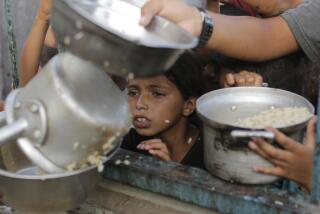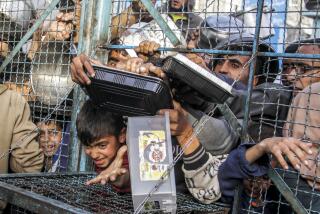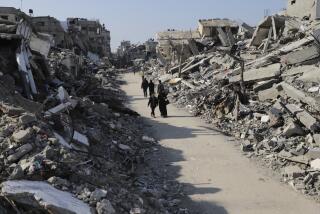Muslims Hold Up Convoy’s Return : Bosnia: In an ironic twist, the U.N. aid column whose way into besieged Mostar was delayed by Croats finds its path out blocked by Muslims fearful of further attacks.
MEDJUGORJE, Bosnia-Herzegovina — A U.N. aid convoy that delivered its goods to 55,000 trapped Muslims was held hostage Thursday for the second time in two days--this time by the Muslims themselves instead of their Croatian enemies.
In a two-day saga that left U.N. officials frustrated and clearly irritated at both sides, a convoy held up by demonstrating Croatian women and children for most of Wednesday finally reached starving Muslims in Mostar early Thursday. But it was then blocked by Muslim women and children who stood in front of the armored personnel carriers that were about to leave the city in south-central Bosnia-Herzegovina.
The Croats had worried that U.N. aid vehicles would deliver food and possibly weapons to the Muslim soldiers who are battling them in the fiercely divided city; the Muslims feared that the Croats would start killing them again when the United Nations left.
The U.N. soldiers, caught in the middle as the world body often has been in this conflict, spent a second sweltering day trapped in their trucks and armored vehicles. The nearly 200 Spanish peacekeeping troops, civilian drivers and aid workers, including Cedric Thornberry, deputy U.N. chief in the former Yugoslav republics, were without food and water.
“Unfortunately . . . those whom we came to help have been holding us hostage here,” said Thornberry, so frustrated that at one point he threatened to stop all humanitarian aid to Bosnia unless the trucks were allowed to pass.
The two-day standoff underscored the United Nations’ mounting problems in delivering aid, particularly in central and southern Bosnia, where a breakdown in the former alliance between Muslims and Croats has sparked vicious fighting and left relief convoys to pass through the battlefields at their peril.
“It really reconfirms the tremendous limits that the humanitarian program has. We have been saying that we are reaching our limits. This is one more indication of that,” said Manuel Alameida o Silva, spokesman for the Office of the U.N. High Commissioner for Refugees.
“The parties to the conflict are imposing more and more limits to where we can go. We had to negotiate to go in at tremendous risks, and now we have to do the same to get out.”
Complicating the picture has been the fact that neither side appears to have complete control of the situation on the ground.
On Wednesday, U.N. officials had an agreement for passage of the convoy from Bosnian Croat leader Mate Boban and Croatian Foreign Minister Mate Granic. Then they found that civilians, with the apparent tacit backing of the Croatian Defense Council (HVO) army, were placing themselves in the convoy’s path in the Croatian-controlled towns of Medjugorje and Citluk.
As the halted convoy sat baking in the sun Wednesday, HVO soldiers said privately that Boban had no idea of what Croats were facing against the Muslims in Mostar, adding that they would allow the vehicles through only if their own field commander gave the clearance.
On Thursday, the United Nations had initial authorization from the Muslim-led Bosnian army to leave Mostar, reportedly after a telephone call from Bosnia’s Muslim president, Alija Izetbegovic. But the convoy found its path blocked once again by both soldiers and civilians later in the day.
As Bosnia’s government prepares to respond, possibly as early as today, to a new peace plan splitting the country into ethnic ministates, the latest standoff in Mostar raises questions about how effectively Izetbegovic--or any of the other parties--can impose peace in a nation rent by war.
It also raises doubts about the ability of the international community to continue to wedge itself between parties that increasingly see humanitarian aid as a potential weapon to benefit their enemies.
Thursday’s standoff, particularly ironic because it was instigated by the intended beneficiaries of the convoy, was the unexpected conclusion to weeks of negotiations on the part of the United Nations to deliver aid to the Muslims in Mostar. They are trapped on the city’s east bank between opposing Croatian forces west of the river and Serbian forces in the hills behind them.
Many of the Muslims were on the brink of starvation, and Thornberry personally intervened and accompanied the convoy, negotiating in the field for two days before the convoy was finally cleared by the Croats to proceed toward Mostar Wednesday evening.
The convoy delivered eight truckloads of relief supplies to Croats on the west side before crossing to the east, where it was initially greeted by enthusiastic and delighted recipients of an estimated 200 tons of relief supplies.
But later in the night, hundreds of Muslim women and children blocked the convoy when it attempted to leave, placing themselves in the path of the vehicles and insisting that the Croats would begin shelling them if the U.N. force were to depart. A barricade of battered buses and trucks was placed in the convoy’s path.
Later, an initial agreement with local army leaders to allow the convoy to pass appeared to break down.
“The situation hasn’t changed all day. There was an agreement with the local government to let them pass, but the people on the street obviously had something different in mind, so the barricades were not removed,” said a U.N. official in Medjugorje, communicating with the convoy by radio.
“The barricades are on the streets, with no serious will of any party on the ground--and by that I mean police, army or people--to move the barricades.”
Muslim army leaders apparently feared that Croats were preparing to attack an estimated 3,000 to 4,000 Muslims trapped on the western, Croatian side of the river as soon as the United Nations left.
More to Read
Sign up for Essential California
The most important California stories and recommendations in your inbox every morning.
You may occasionally receive promotional content from the Los Angeles Times.










